Royal Commission: Misconduct in Banking and Financial Services Industry
VerifiedAdded on 2023/04/17
|12
|3007
|383
AI Summary
The paper discusses the Royal Commission report into the misconduct in banking, superannuation, and financial services industry. The paper investigates how the Royal Commission applied ethical theory to make the final report which is made of recommendations. Additionally, the Accounting Professional and ethical standards (APES) analyzes the ethical issues regarding the freedom’s expectations of its agents to use aggressive and inappropriate sales tactics.
Contribute Materials
Your contribution can guide someone’s learning journey. Share your
documents today.
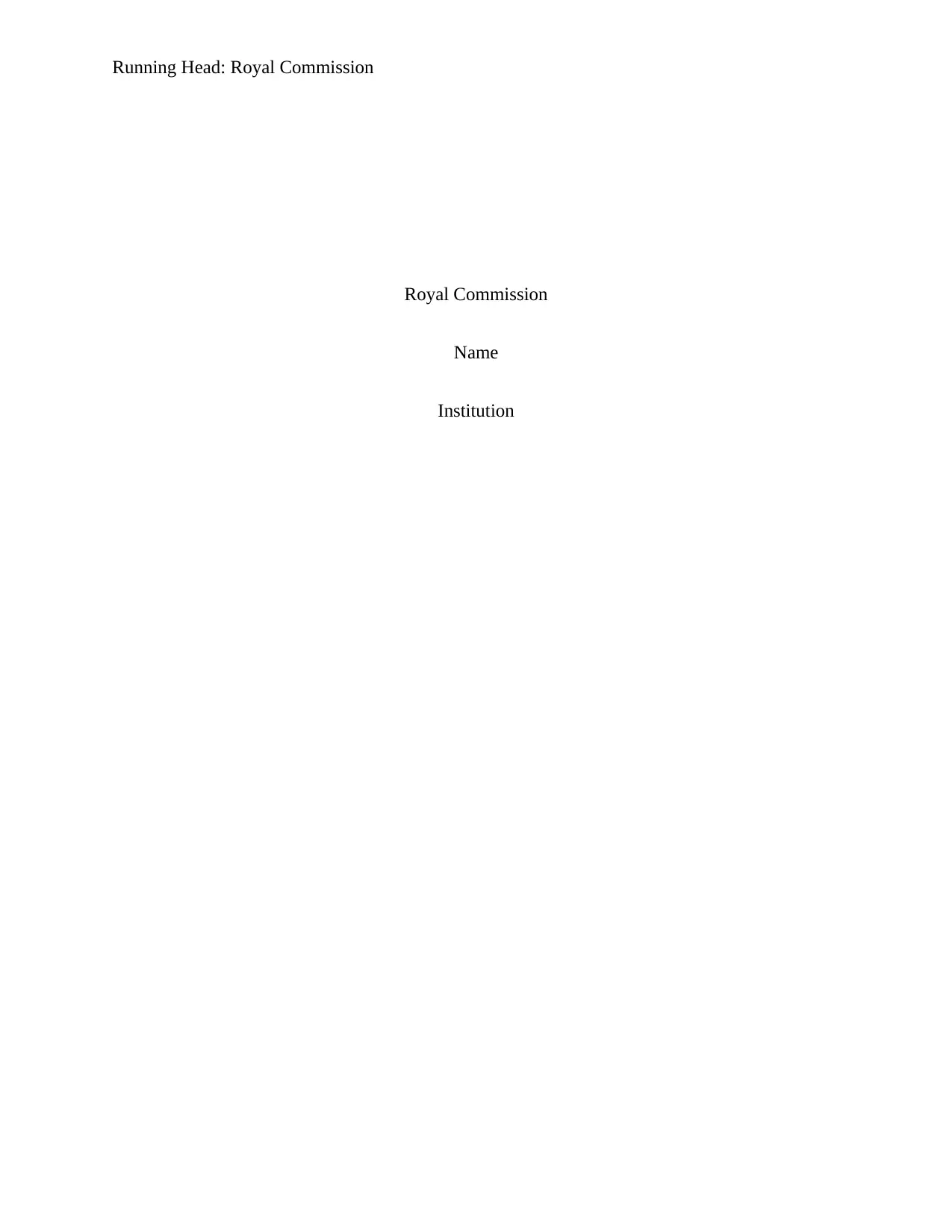
Running Head: Royal Commission
Royal Commission
Name
Institution
Royal Commission
Name
Institution
Secure Best Marks with AI Grader
Need help grading? Try our AI Grader for instant feedback on your assignments.
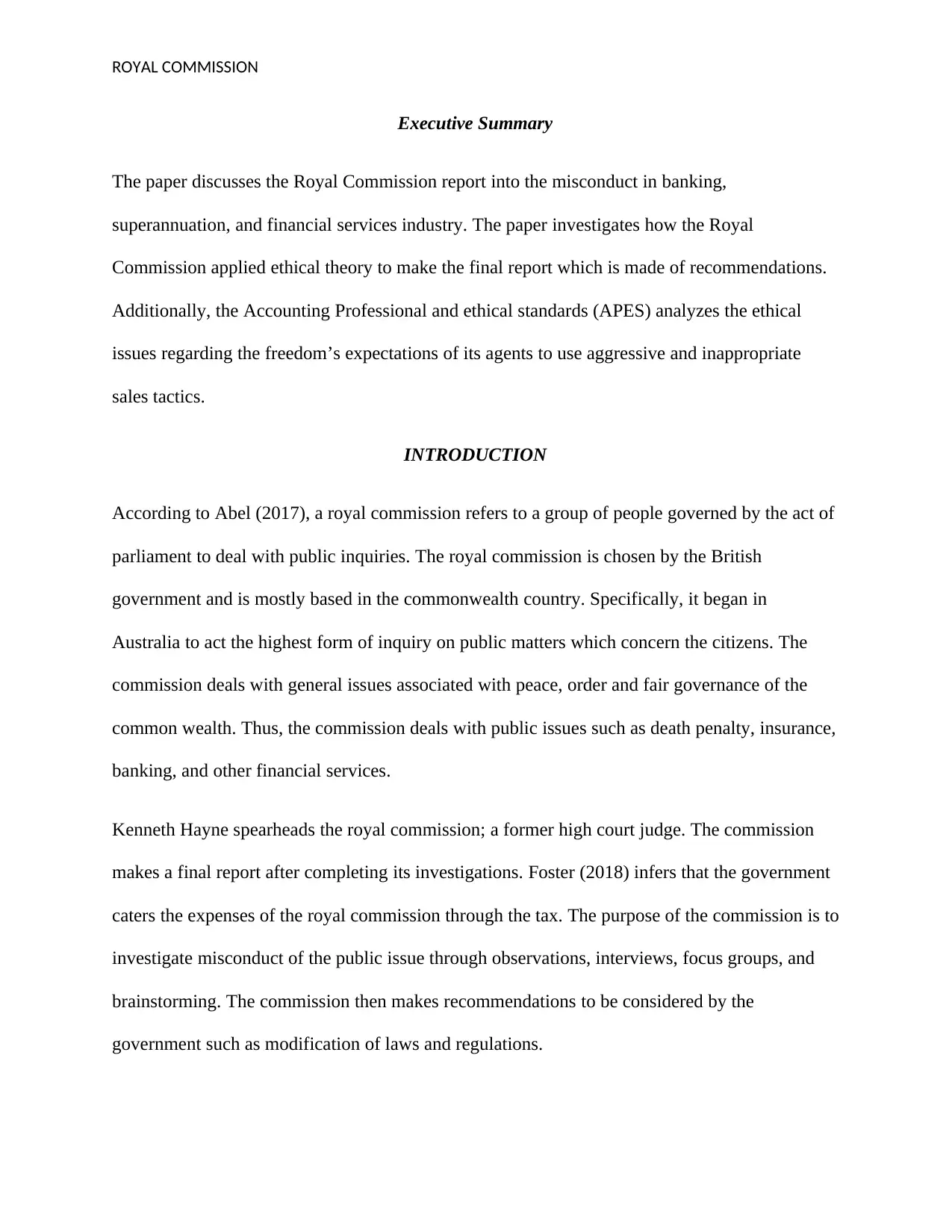
ROYAL COMMISSION
Executive Summary
The paper discusses the Royal Commission report into the misconduct in banking,
superannuation, and financial services industry. The paper investigates how the Royal
Commission applied ethical theory to make the final report which is made of recommendations.
Additionally, the Accounting Professional and ethical standards (APES) analyzes the ethical
issues regarding the freedom’s expectations of its agents to use aggressive and inappropriate
sales tactics.
INTRODUCTION
According to Abel (2017), a royal commission refers to a group of people governed by the act of
parliament to deal with public inquiries. The royal commission is chosen by the British
government and is mostly based in the commonwealth country. Specifically, it began in
Australia to act the highest form of inquiry on public matters which concern the citizens. The
commission deals with general issues associated with peace, order and fair governance of the
common wealth. Thus, the commission deals with public issues such as death penalty, insurance,
banking, and other financial services.
Kenneth Hayne spearheads the royal commission; a former high court judge. The commission
makes a final report after completing its investigations. Foster (2018) infers that the government
caters the expenses of the royal commission through the tax. The purpose of the commission is to
investigate misconduct of the public issue through observations, interviews, focus groups, and
brainstorming. The commission then makes recommendations to be considered by the
government such as modification of laws and regulations.
Executive Summary
The paper discusses the Royal Commission report into the misconduct in banking,
superannuation, and financial services industry. The paper investigates how the Royal
Commission applied ethical theory to make the final report which is made of recommendations.
Additionally, the Accounting Professional and ethical standards (APES) analyzes the ethical
issues regarding the freedom’s expectations of its agents to use aggressive and inappropriate
sales tactics.
INTRODUCTION
According to Abel (2017), a royal commission refers to a group of people governed by the act of
parliament to deal with public inquiries. The royal commission is chosen by the British
government and is mostly based in the commonwealth country. Specifically, it began in
Australia to act the highest form of inquiry on public matters which concern the citizens. The
commission deals with general issues associated with peace, order and fair governance of the
common wealth. Thus, the commission deals with public issues such as death penalty, insurance,
banking, and other financial services.
Kenneth Hayne spearheads the royal commission; a former high court judge. The commission
makes a final report after completing its investigations. Foster (2018) infers that the government
caters the expenses of the royal commission through the tax. The purpose of the commission is to
investigate misconduct of the public issue through observations, interviews, focus groups, and
brainstorming. The commission then makes recommendations to be considered by the
government such as modification of laws and regulations.
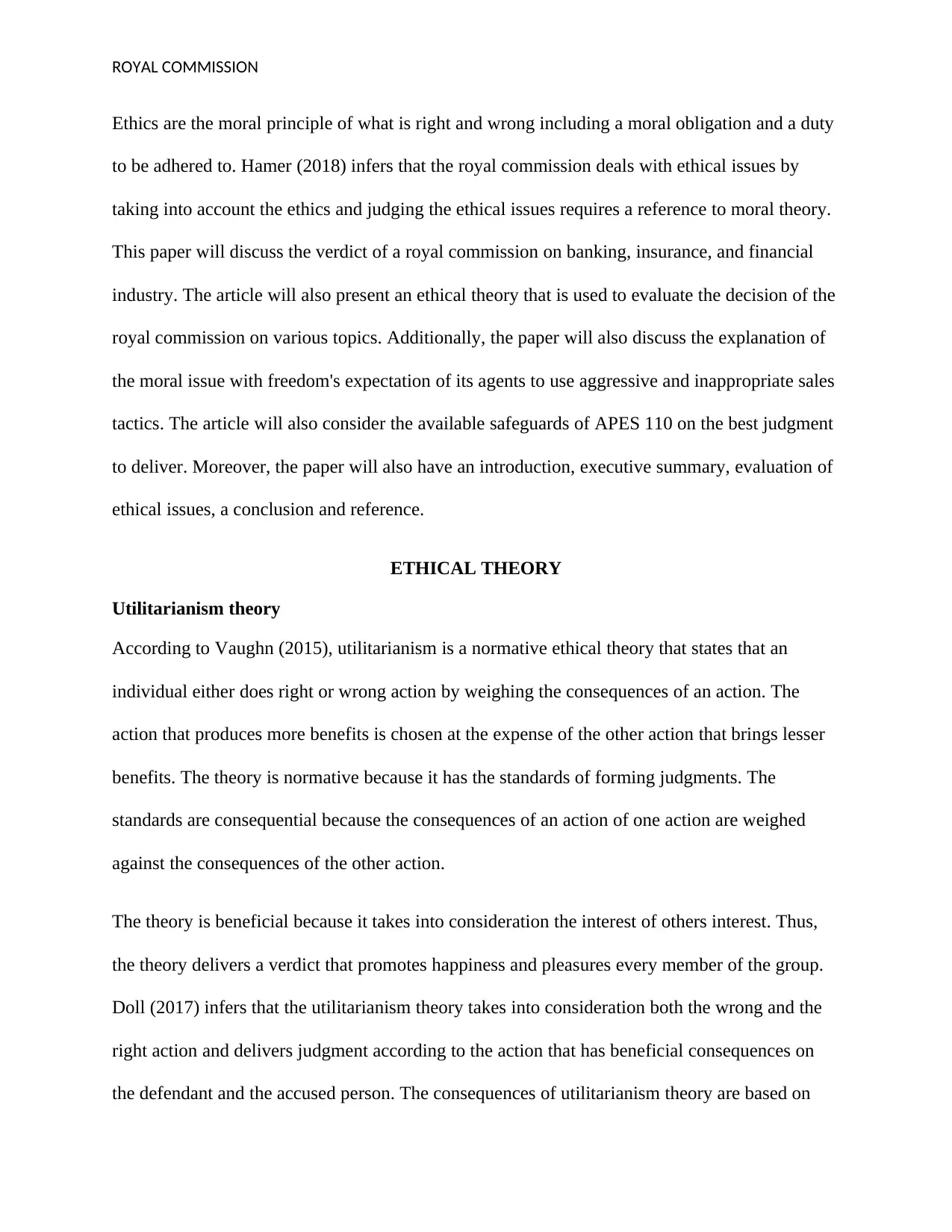
ROYAL COMMISSION
Ethics are the moral principle of what is right and wrong including a moral obligation and a duty
to be adhered to. Hamer (2018) infers that the royal commission deals with ethical issues by
taking into account the ethics and judging the ethical issues requires a reference to moral theory.
This paper will discuss the verdict of a royal commission on banking, insurance, and financial
industry. The article will also present an ethical theory that is used to evaluate the decision of the
royal commission on various topics. Additionally, the paper will also discuss the explanation of
the moral issue with freedom's expectation of its agents to use aggressive and inappropriate sales
tactics. The article will also consider the available safeguards of APES 110 on the best judgment
to deliver. Moreover, the paper will also have an introduction, executive summary, evaluation of
ethical issues, a conclusion and reference.
ETHICAL THEORY
Utilitarianism theory
According to Vaughn (2015), utilitarianism is a normative ethical theory that states that an
individual either does right or wrong action by weighing the consequences of an action. The
action that produces more benefits is chosen at the expense of the other action that brings lesser
benefits. The theory is normative because it has the standards of forming judgments. The
standards are consequential because the consequences of an action of one action are weighed
against the consequences of the other action.
The theory is beneficial because it takes into consideration the interest of others interest. Thus,
the theory delivers a verdict that promotes happiness and pleasures every member of the group.
Doll (2017) infers that the utilitarianism theory takes into consideration both the wrong and the
right action and delivers judgment according to the action that has beneficial consequences on
the defendant and the accused person. The consequences of utilitarianism theory are based on
Ethics are the moral principle of what is right and wrong including a moral obligation and a duty
to be adhered to. Hamer (2018) infers that the royal commission deals with ethical issues by
taking into account the ethics and judging the ethical issues requires a reference to moral theory.
This paper will discuss the verdict of a royal commission on banking, insurance, and financial
industry. The article will also present an ethical theory that is used to evaluate the decision of the
royal commission on various topics. Additionally, the paper will also discuss the explanation of
the moral issue with freedom's expectation of its agents to use aggressive and inappropriate sales
tactics. The article will also consider the available safeguards of APES 110 on the best judgment
to deliver. Moreover, the paper will also have an introduction, executive summary, evaluation of
ethical issues, a conclusion and reference.
ETHICAL THEORY
Utilitarianism theory
According to Vaughn (2015), utilitarianism is a normative ethical theory that states that an
individual either does right or wrong action by weighing the consequences of an action. The
action that produces more benefits is chosen at the expense of the other action that brings lesser
benefits. The theory is normative because it has the standards of forming judgments. The
standards are consequential because the consequences of an action of one action are weighed
against the consequences of the other action.
The theory is beneficial because it takes into consideration the interest of others interest. Thus,
the theory delivers a verdict that promotes happiness and pleasures every member of the group.
Doll (2017) infers that the utilitarianism theory takes into consideration both the wrong and the
right action and delivers judgment according to the action that has beneficial consequences on
the defendant and the accused person. The consequences of utilitarianism theory are based on
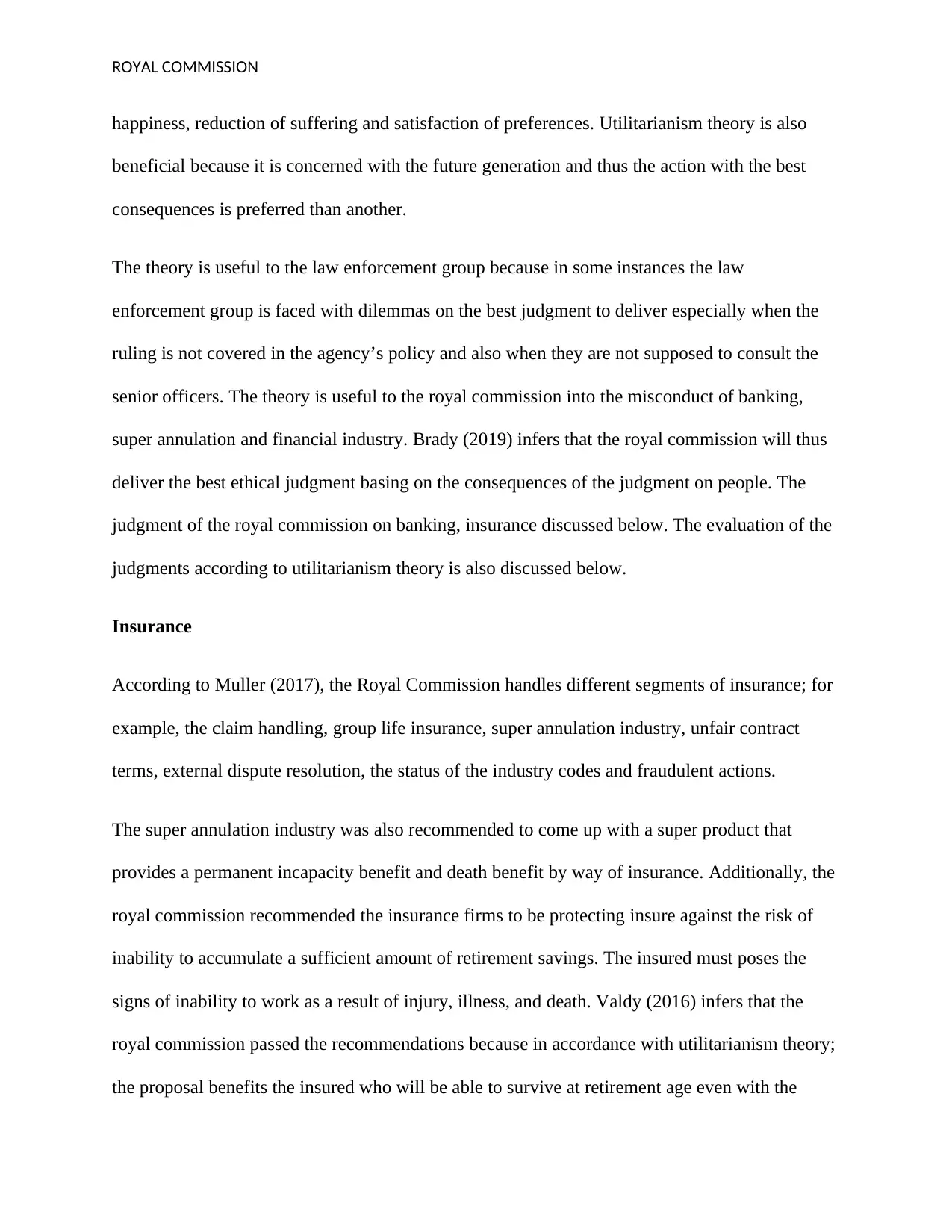
ROYAL COMMISSION
happiness, reduction of suffering and satisfaction of preferences. Utilitarianism theory is also
beneficial because it is concerned with the future generation and thus the action with the best
consequences is preferred than another.
The theory is useful to the law enforcement group because in some instances the law
enforcement group is faced with dilemmas on the best judgment to deliver especially when the
ruling is not covered in the agency’s policy and also when they are not supposed to consult the
senior officers. The theory is useful to the royal commission into the misconduct of banking,
super annulation and financial industry. Brady (2019) infers that the royal commission will thus
deliver the best ethical judgment basing on the consequences of the judgment on people. The
judgment of the royal commission on banking, insurance discussed below. The evaluation of the
judgments according to utilitarianism theory is also discussed below.
Insurance
According to Muller (2017), the Royal Commission handles different segments of insurance; for
example, the claim handling, group life insurance, super annulation industry, unfair contract
terms, external dispute resolution, the status of the industry codes and fraudulent actions.
The super annulation industry was also recommended to come up with a super product that
provides a permanent incapacity benefit and death benefit by way of insurance. Additionally, the
royal commission recommended the insurance firms to be protecting insure against the risk of
inability to accumulate a sufficient amount of retirement savings. The insured must poses the
signs of inability to work as a result of injury, illness, and death. Valdy (2016) infers that the
royal commission passed the recommendations because in accordance with utilitarianism theory;
the proposal benefits the insured who will be able to survive at retirement age even with the
happiness, reduction of suffering and satisfaction of preferences. Utilitarianism theory is also
beneficial because it is concerned with the future generation and thus the action with the best
consequences is preferred than another.
The theory is useful to the law enforcement group because in some instances the law
enforcement group is faced with dilemmas on the best judgment to deliver especially when the
ruling is not covered in the agency’s policy and also when they are not supposed to consult the
senior officers. The theory is useful to the royal commission into the misconduct of banking,
super annulation and financial industry. Brady (2019) infers that the royal commission will thus
deliver the best ethical judgment basing on the consequences of the judgment on people. The
judgment of the royal commission on banking, insurance discussed below. The evaluation of the
judgments according to utilitarianism theory is also discussed below.
Insurance
According to Muller (2017), the Royal Commission handles different segments of insurance; for
example, the claim handling, group life insurance, super annulation industry, unfair contract
terms, external dispute resolution, the status of the industry codes and fraudulent actions.
The super annulation industry was also recommended to come up with a super product that
provides a permanent incapacity benefit and death benefit by way of insurance. Additionally, the
royal commission recommended the insurance firms to be protecting insure against the risk of
inability to accumulate a sufficient amount of retirement savings. The insured must poses the
signs of inability to work as a result of injury, illness, and death. Valdy (2016) infers that the
royal commission passed the recommendations because in accordance with utilitarianism theory;
the proposal benefits the insured who will be able to survive at retirement age even with the
Secure Best Marks with AI Grader
Need help grading? Try our AI Grader for instant feedback on your assignments.
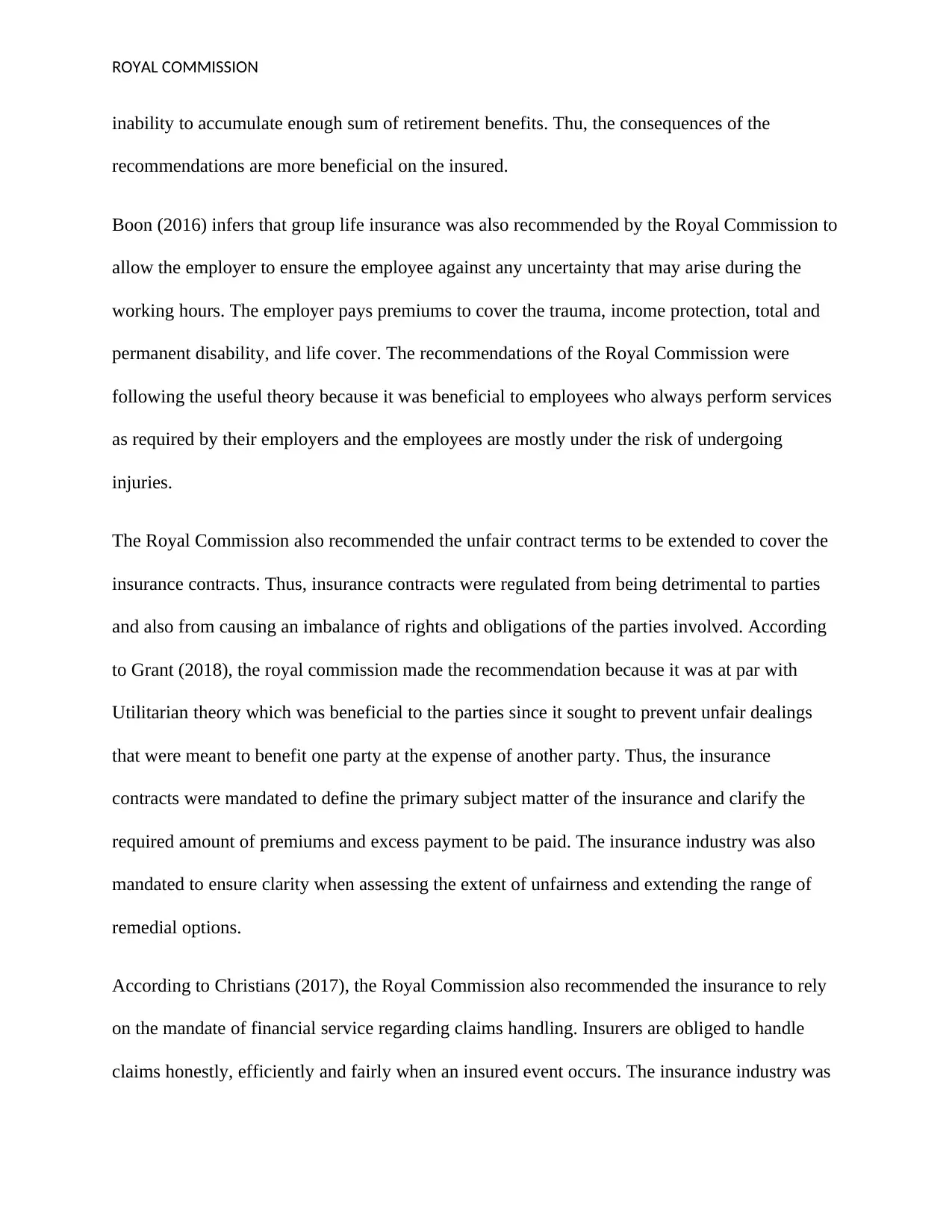
ROYAL COMMISSION
inability to accumulate enough sum of retirement benefits. Thu, the consequences of the
recommendations are more beneficial on the insured.
Boon (2016) infers that group life insurance was also recommended by the Royal Commission to
allow the employer to ensure the employee against any uncertainty that may arise during the
working hours. The employer pays premiums to cover the trauma, income protection, total and
permanent disability, and life cover. The recommendations of the Royal Commission were
following the useful theory because it was beneficial to employees who always perform services
as required by their employers and the employees are mostly under the risk of undergoing
injuries.
The Royal Commission also recommended the unfair contract terms to be extended to cover the
insurance contracts. Thus, insurance contracts were regulated from being detrimental to parties
and also from causing an imbalance of rights and obligations of the parties involved. According
to Grant (2018), the royal commission made the recommendation because it was at par with
Utilitarian theory which was beneficial to the parties since it sought to prevent unfair dealings
that were meant to benefit one party at the expense of another party. Thus, the insurance
contracts were mandated to define the primary subject matter of the insurance and clarify the
required amount of premiums and excess payment to be paid. The insurance industry was also
mandated to ensure clarity when assessing the extent of unfairness and extending the range of
remedial options.
According to Christians (2017), the Royal Commission also recommended the insurance to rely
on the mandate of financial service regarding claims handling. Insurers are obliged to handle
claims honestly, efficiently and fairly when an insured event occurs. The insurance industry was
inability to accumulate enough sum of retirement benefits. Thu, the consequences of the
recommendations are more beneficial on the insured.
Boon (2016) infers that group life insurance was also recommended by the Royal Commission to
allow the employer to ensure the employee against any uncertainty that may arise during the
working hours. The employer pays premiums to cover the trauma, income protection, total and
permanent disability, and life cover. The recommendations of the Royal Commission were
following the useful theory because it was beneficial to employees who always perform services
as required by their employers and the employees are mostly under the risk of undergoing
injuries.
The Royal Commission also recommended the unfair contract terms to be extended to cover the
insurance contracts. Thus, insurance contracts were regulated from being detrimental to parties
and also from causing an imbalance of rights and obligations of the parties involved. According
to Grant (2018), the royal commission made the recommendation because it was at par with
Utilitarian theory which was beneficial to the parties since it sought to prevent unfair dealings
that were meant to benefit one party at the expense of another party. Thus, the insurance
contracts were mandated to define the primary subject matter of the insurance and clarify the
required amount of premiums and excess payment to be paid. The insurance industry was also
mandated to ensure clarity when assessing the extent of unfairness and extending the range of
remedial options.
According to Christians (2017), the Royal Commission also recommended the insurance to rely
on the mandate of financial service regarding claims handling. Insurers are obliged to handle
claims honestly, efficiently and fairly when an insured event occurs. The insurance industry was
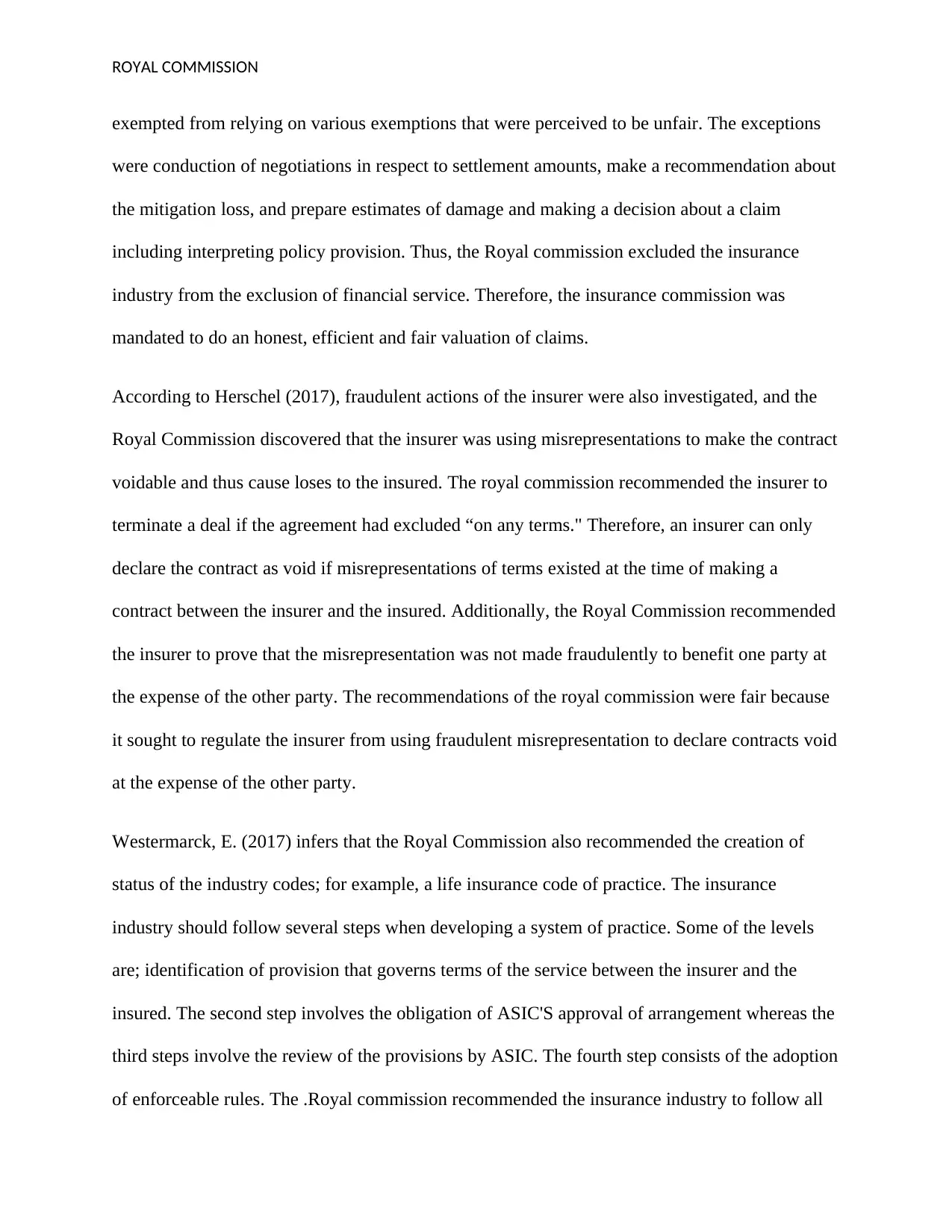
ROYAL COMMISSION
exempted from relying on various exemptions that were perceived to be unfair. The exceptions
were conduction of negotiations in respect to settlement amounts, make a recommendation about
the mitigation loss, and prepare estimates of damage and making a decision about a claim
including interpreting policy provision. Thus, the Royal commission excluded the insurance
industry from the exclusion of financial service. Therefore, the insurance commission was
mandated to do an honest, efficient and fair valuation of claims.
According to Herschel (2017), fraudulent actions of the insurer were also investigated, and the
Royal Commission discovered that the insurer was using misrepresentations to make the contract
voidable and thus cause loses to the insured. The royal commission recommended the insurer to
terminate a deal if the agreement had excluded “on any terms." Therefore, an insurer can only
declare the contract as void if misrepresentations of terms existed at the time of making a
contract between the insurer and the insured. Additionally, the Royal Commission recommended
the insurer to prove that the misrepresentation was not made fraudulently to benefit one party at
the expense of the other party. The recommendations of the royal commission were fair because
it sought to regulate the insurer from using fraudulent misrepresentation to declare contracts void
at the expense of the other party.
Westermarck, E. (2017) infers that the Royal Commission also recommended the creation of
status of the industry codes; for example, a life insurance code of practice. The insurance
industry should follow several steps when developing a system of practice. Some of the levels
are; identification of provision that governs terms of the service between the insurer and the
insured. The second step involves the obligation of ASIC'S approval of arrangement whereas the
third steps involve the review of the provisions by ASIC. The fourth step consists of the adoption
of enforceable rules. The .Royal commission recommended the insurance industry to follow all
exempted from relying on various exemptions that were perceived to be unfair. The exceptions
were conduction of negotiations in respect to settlement amounts, make a recommendation about
the mitigation loss, and prepare estimates of damage and making a decision about a claim
including interpreting policy provision. Thus, the Royal commission excluded the insurance
industry from the exclusion of financial service. Therefore, the insurance commission was
mandated to do an honest, efficient and fair valuation of claims.
According to Herschel (2017), fraudulent actions of the insurer were also investigated, and the
Royal Commission discovered that the insurer was using misrepresentations to make the contract
voidable and thus cause loses to the insured. The royal commission recommended the insurer to
terminate a deal if the agreement had excluded “on any terms." Therefore, an insurer can only
declare the contract as void if misrepresentations of terms existed at the time of making a
contract between the insurer and the insured. Additionally, the Royal Commission recommended
the insurer to prove that the misrepresentation was not made fraudulently to benefit one party at
the expense of the other party. The recommendations of the royal commission were fair because
it sought to regulate the insurer from using fraudulent misrepresentation to declare contracts void
at the expense of the other party.
Westermarck, E. (2017) infers that the Royal Commission also recommended the creation of
status of the industry codes; for example, a life insurance code of practice. The insurance
industry should follow several steps when developing a system of practice. Some of the levels
are; identification of provision that governs terms of the service between the insurer and the
insured. The second step involves the obligation of ASIC'S approval of arrangement whereas the
third steps involve the review of the provisions by ASIC. The fourth step consists of the adoption
of enforceable rules. The .Royal commission recommended the insurance industry to follow all
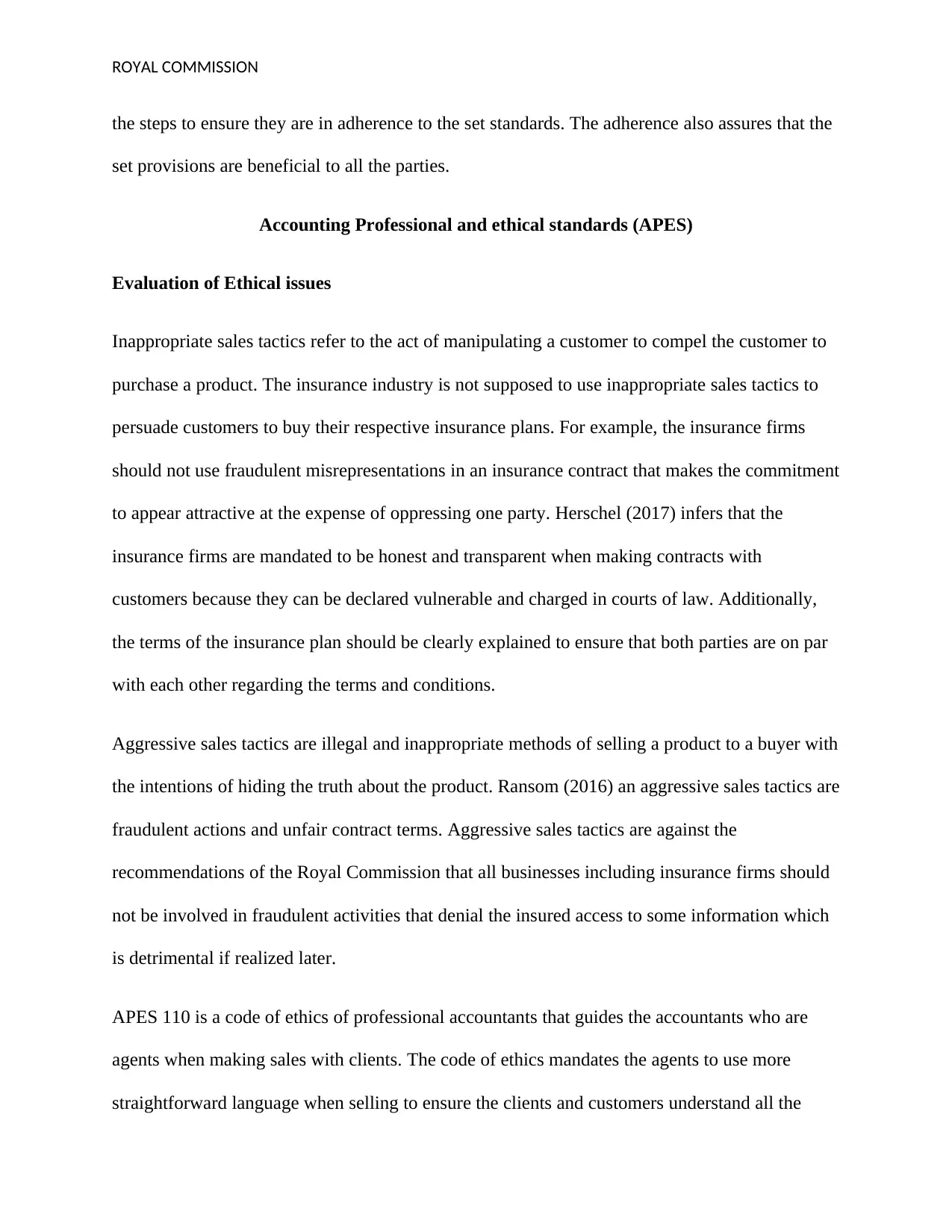
ROYAL COMMISSION
the steps to ensure they are in adherence to the set standards. The adherence also assures that the
set provisions are beneficial to all the parties.
Accounting Professional and ethical standards (APES)
Evaluation of Ethical issues
Inappropriate sales tactics refer to the act of manipulating a customer to compel the customer to
purchase a product. The insurance industry is not supposed to use inappropriate sales tactics to
persuade customers to buy their respective insurance plans. For example, the insurance firms
should not use fraudulent misrepresentations in an insurance contract that makes the commitment
to appear attractive at the expense of oppressing one party. Herschel (2017) infers that the
insurance firms are mandated to be honest and transparent when making contracts with
customers because they can be declared vulnerable and charged in courts of law. Additionally,
the terms of the insurance plan should be clearly explained to ensure that both parties are on par
with each other regarding the terms and conditions.
Aggressive sales tactics are illegal and inappropriate methods of selling a product to a buyer with
the intentions of hiding the truth about the product. Ransom (2016) an aggressive sales tactics are
fraudulent actions and unfair contract terms. Aggressive sales tactics are against the
recommendations of the Royal Commission that all businesses including insurance firms should
not be involved in fraudulent activities that denial the insured access to some information which
is detrimental if realized later.
APES 110 is a code of ethics of professional accountants that guides the accountants who are
agents when making sales with clients. The code of ethics mandates the agents to use more
straightforward language when selling to ensure the clients and customers understand all the
the steps to ensure they are in adherence to the set standards. The adherence also assures that the
set provisions are beneficial to all the parties.
Accounting Professional and ethical standards (APES)
Evaluation of Ethical issues
Inappropriate sales tactics refer to the act of manipulating a customer to compel the customer to
purchase a product. The insurance industry is not supposed to use inappropriate sales tactics to
persuade customers to buy their respective insurance plans. For example, the insurance firms
should not use fraudulent misrepresentations in an insurance contract that makes the commitment
to appear attractive at the expense of oppressing one party. Herschel (2017) infers that the
insurance firms are mandated to be honest and transparent when making contracts with
customers because they can be declared vulnerable and charged in courts of law. Additionally,
the terms of the insurance plan should be clearly explained to ensure that both parties are on par
with each other regarding the terms and conditions.
Aggressive sales tactics are illegal and inappropriate methods of selling a product to a buyer with
the intentions of hiding the truth about the product. Ransom (2016) an aggressive sales tactics are
fraudulent actions and unfair contract terms. Aggressive sales tactics are against the
recommendations of the Royal Commission that all businesses including insurance firms should
not be involved in fraudulent activities that denial the insured access to some information which
is detrimental if realized later.
APES 110 is a code of ethics of professional accountants that guides the accountants who are
agents when making sales with clients. The code of ethics mandates the agents to use more
straightforward language when selling to ensure the clients and customers understand all the
Paraphrase This Document
Need a fresh take? Get an instant paraphrase of this document with our AI Paraphraser
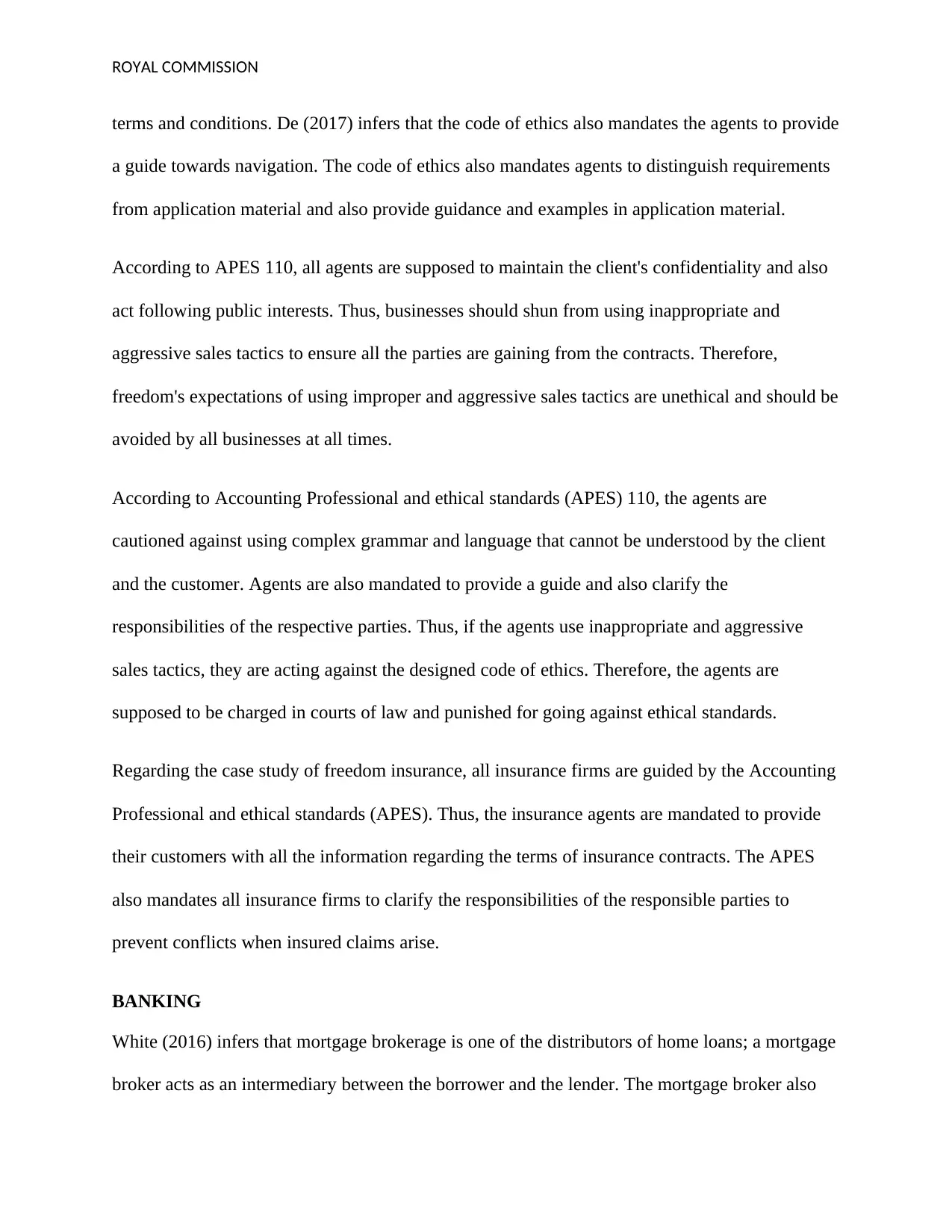
ROYAL COMMISSION
terms and conditions. De (2017) infers that the code of ethics also mandates the agents to provide
a guide towards navigation. The code of ethics also mandates agents to distinguish requirements
from application material and also provide guidance and examples in application material.
According to APES 110, all agents are supposed to maintain the client's confidentiality and also
act following public interests. Thus, businesses should shun from using inappropriate and
aggressive sales tactics to ensure all the parties are gaining from the contracts. Therefore,
freedom's expectations of using improper and aggressive sales tactics are unethical and should be
avoided by all businesses at all times.
According to Accounting Professional and ethical standards (APES) 110, the agents are
cautioned against using complex grammar and language that cannot be understood by the client
and the customer. Agents are also mandated to provide a guide and also clarify the
responsibilities of the respective parties. Thus, if the agents use inappropriate and aggressive
sales tactics, they are acting against the designed code of ethics. Therefore, the agents are
supposed to be charged in courts of law and punished for going against ethical standards.
Regarding the case study of freedom insurance, all insurance firms are guided by the Accounting
Professional and ethical standards (APES). Thus, the insurance agents are mandated to provide
their customers with all the information regarding the terms of insurance contracts. The APES
also mandates all insurance firms to clarify the responsibilities of the responsible parties to
prevent conflicts when insured claims arise.
BANKING
White (2016) infers that mortgage brokerage is one of the distributors of home loans; a mortgage
broker acts as an intermediary between the borrower and the lender. The mortgage broker also
terms and conditions. De (2017) infers that the code of ethics also mandates the agents to provide
a guide towards navigation. The code of ethics also mandates agents to distinguish requirements
from application material and also provide guidance and examples in application material.
According to APES 110, all agents are supposed to maintain the client's confidentiality and also
act following public interests. Thus, businesses should shun from using inappropriate and
aggressive sales tactics to ensure all the parties are gaining from the contracts. Therefore,
freedom's expectations of using improper and aggressive sales tactics are unethical and should be
avoided by all businesses at all times.
According to Accounting Professional and ethical standards (APES) 110, the agents are
cautioned against using complex grammar and language that cannot be understood by the client
and the customer. Agents are also mandated to provide a guide and also clarify the
responsibilities of the respective parties. Thus, if the agents use inappropriate and aggressive
sales tactics, they are acting against the designed code of ethics. Therefore, the agents are
supposed to be charged in courts of law and punished for going against ethical standards.
Regarding the case study of freedom insurance, all insurance firms are guided by the Accounting
Professional and ethical standards (APES). Thus, the insurance agents are mandated to provide
their customers with all the information regarding the terms of insurance contracts. The APES
also mandates all insurance firms to clarify the responsibilities of the responsible parties to
prevent conflicts when insured claims arise.
BANKING
White (2016) infers that mortgage brokerage is one of the distributors of home loans; a mortgage
broker acts as an intermediary between the borrower and the lender. The mortgage broker also
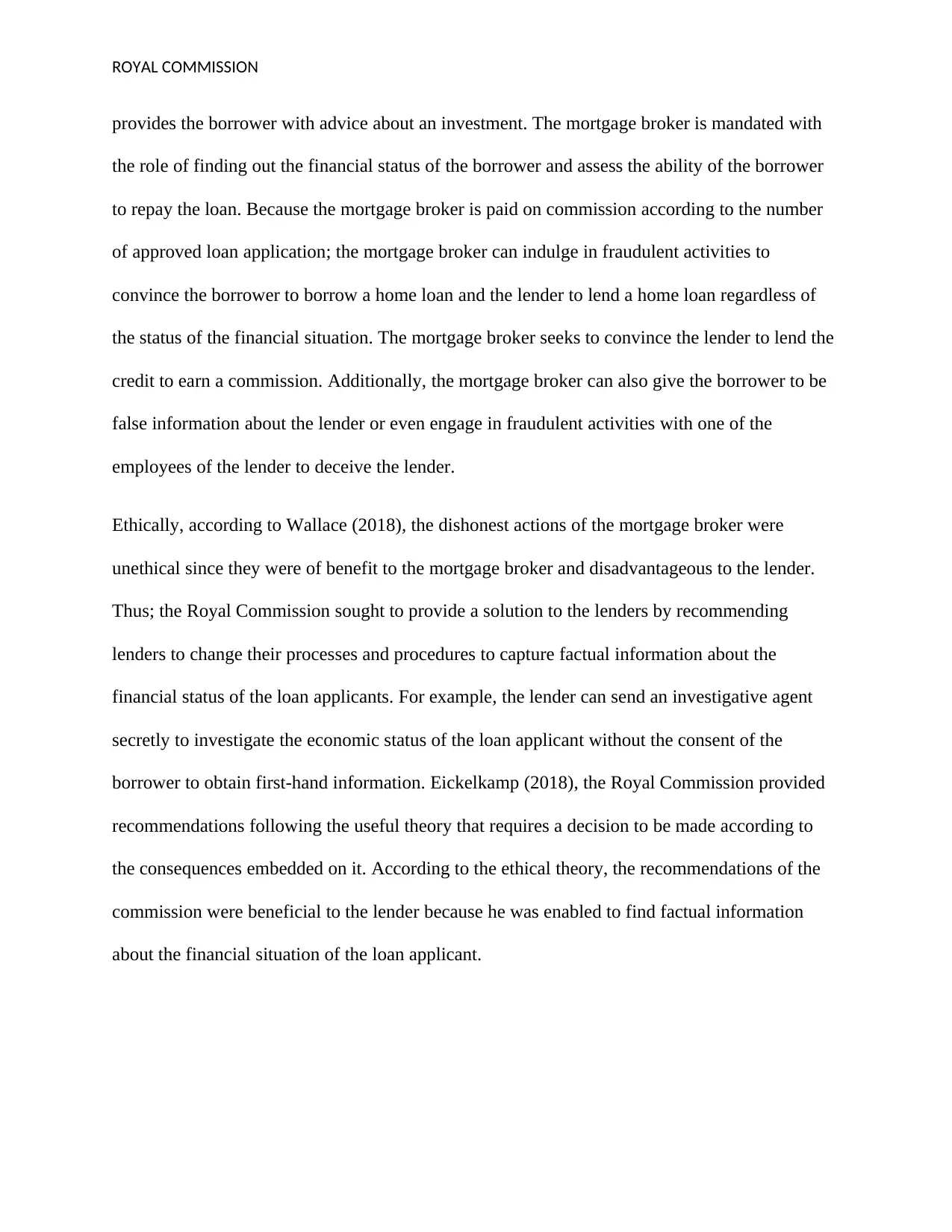
ROYAL COMMISSION
provides the borrower with advice about an investment. The mortgage broker is mandated with
the role of finding out the financial status of the borrower and assess the ability of the borrower
to repay the loan. Because the mortgage broker is paid on commission according to the number
of approved loan application; the mortgage broker can indulge in fraudulent activities to
convince the borrower to borrow a home loan and the lender to lend a home loan regardless of
the status of the financial situation. The mortgage broker seeks to convince the lender to lend the
credit to earn a commission. Additionally, the mortgage broker can also give the borrower to be
false information about the lender or even engage in fraudulent activities with one of the
employees of the lender to deceive the lender.
Ethically, according to Wallace (2018), the dishonest actions of the mortgage broker were
unethical since they were of benefit to the mortgage broker and disadvantageous to the lender.
Thus; the Royal Commission sought to provide a solution to the lenders by recommending
lenders to change their processes and procedures to capture factual information about the
financial status of the loan applicants. For example, the lender can send an investigative agent
secretly to investigate the economic status of the loan applicant without the consent of the
borrower to obtain first-hand information. Eickelkamp (2018), the Royal Commission provided
recommendations following the useful theory that requires a decision to be made according to
the consequences embedded on it. According to the ethical theory, the recommendations of the
commission were beneficial to the lender because he was enabled to find factual information
about the financial situation of the loan applicant.
provides the borrower with advice about an investment. The mortgage broker is mandated with
the role of finding out the financial status of the borrower and assess the ability of the borrower
to repay the loan. Because the mortgage broker is paid on commission according to the number
of approved loan application; the mortgage broker can indulge in fraudulent activities to
convince the borrower to borrow a home loan and the lender to lend a home loan regardless of
the status of the financial situation. The mortgage broker seeks to convince the lender to lend the
credit to earn a commission. Additionally, the mortgage broker can also give the borrower to be
false information about the lender or even engage in fraudulent activities with one of the
employees of the lender to deceive the lender.
Ethically, according to Wallace (2018), the dishonest actions of the mortgage broker were
unethical since they were of benefit to the mortgage broker and disadvantageous to the lender.
Thus; the Royal Commission sought to provide a solution to the lenders by recommending
lenders to change their processes and procedures to capture factual information about the
financial status of the loan applicants. For example, the lender can send an investigative agent
secretly to investigate the economic status of the loan applicant without the consent of the
borrower to obtain first-hand information. Eickelkamp (2018), the Royal Commission provided
recommendations following the useful theory that requires a decision to be made according to
the consequences embedded on it. According to the ethical theory, the recommendations of the
commission were beneficial to the lender because he was enabled to find factual information
about the financial situation of the loan applicant.
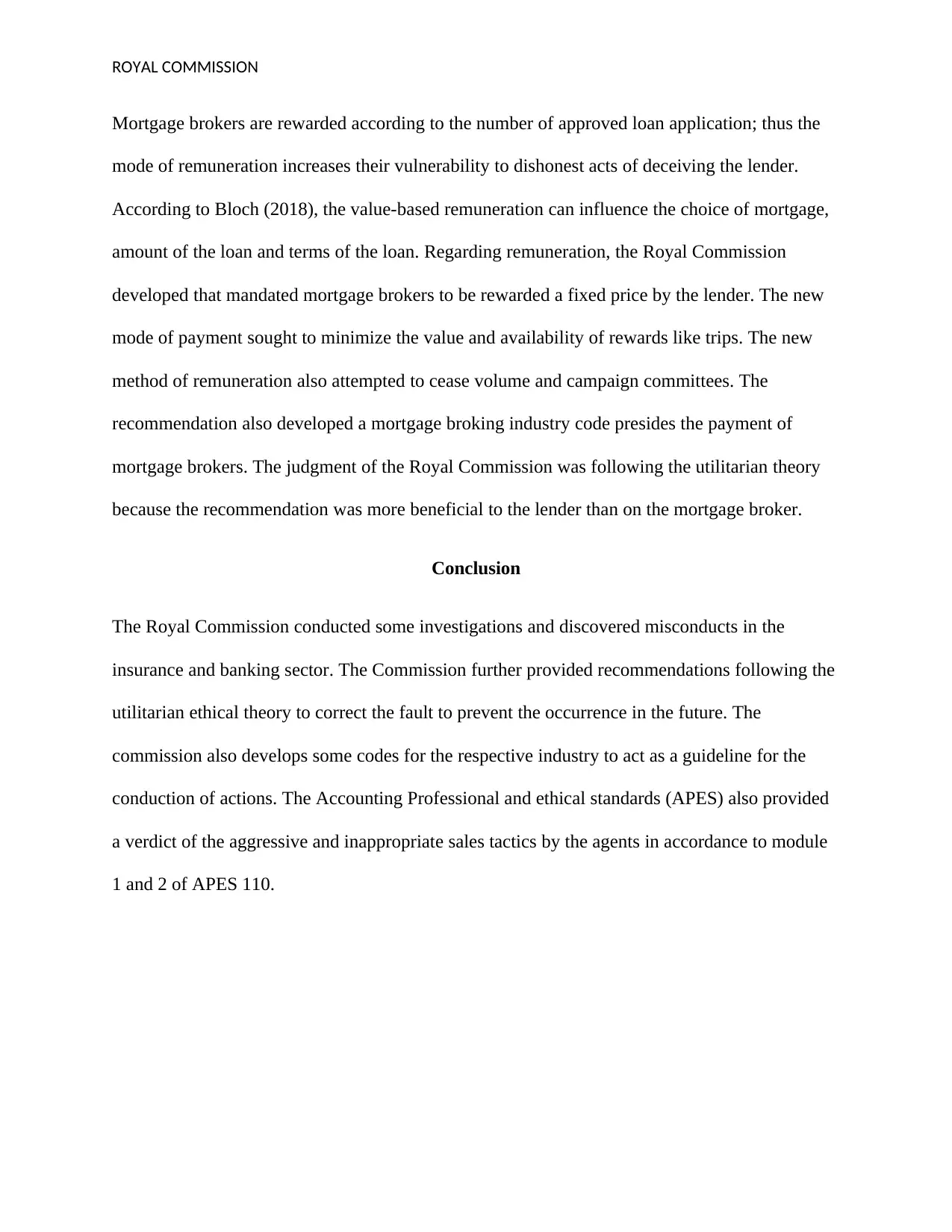
ROYAL COMMISSION
Mortgage brokers are rewarded according to the number of approved loan application; thus the
mode of remuneration increases their vulnerability to dishonest acts of deceiving the lender.
According to Bloch (2018), the value-based remuneration can influence the choice of mortgage,
amount of the loan and terms of the loan. Regarding remuneration, the Royal Commission
developed that mandated mortgage brokers to be rewarded a fixed price by the lender. The new
mode of payment sought to minimize the value and availability of rewards like trips. The new
method of remuneration also attempted to cease volume and campaign committees. The
recommendation also developed a mortgage broking industry code presides the payment of
mortgage brokers. The judgment of the Royal Commission was following the utilitarian theory
because the recommendation was more beneficial to the lender than on the mortgage broker.
Conclusion
The Royal Commission conducted some investigations and discovered misconducts in the
insurance and banking sector. The Commission further provided recommendations following the
utilitarian ethical theory to correct the fault to prevent the occurrence in the future. The
commission also develops some codes for the respective industry to act as a guideline for the
conduction of actions. The Accounting Professional and ethical standards (APES) also provided
a verdict of the aggressive and inappropriate sales tactics by the agents in accordance to module
1 and 2 of APES 110.
Mortgage brokers are rewarded according to the number of approved loan application; thus the
mode of remuneration increases their vulnerability to dishonest acts of deceiving the lender.
According to Bloch (2018), the value-based remuneration can influence the choice of mortgage,
amount of the loan and terms of the loan. Regarding remuneration, the Royal Commission
developed that mandated mortgage brokers to be rewarded a fixed price by the lender. The new
mode of payment sought to minimize the value and availability of rewards like trips. The new
method of remuneration also attempted to cease volume and campaign committees. The
recommendation also developed a mortgage broking industry code presides the payment of
mortgage brokers. The judgment of the Royal Commission was following the utilitarian theory
because the recommendation was more beneficial to the lender than on the mortgage broker.
Conclusion
The Royal Commission conducted some investigations and discovered misconducts in the
insurance and banking sector. The Commission further provided recommendations following the
utilitarian ethical theory to correct the fault to prevent the occurrence in the future. The
commission also develops some codes for the respective industry to act as a guideline for the
conduction of actions. The Accounting Professional and ethical standards (APES) also provided
a verdict of the aggressive and inappropriate sales tactics by the agents in accordance to module
1 and 2 of APES 110.
Secure Best Marks with AI Grader
Need help grading? Try our AI Grader for instant feedback on your assignments.
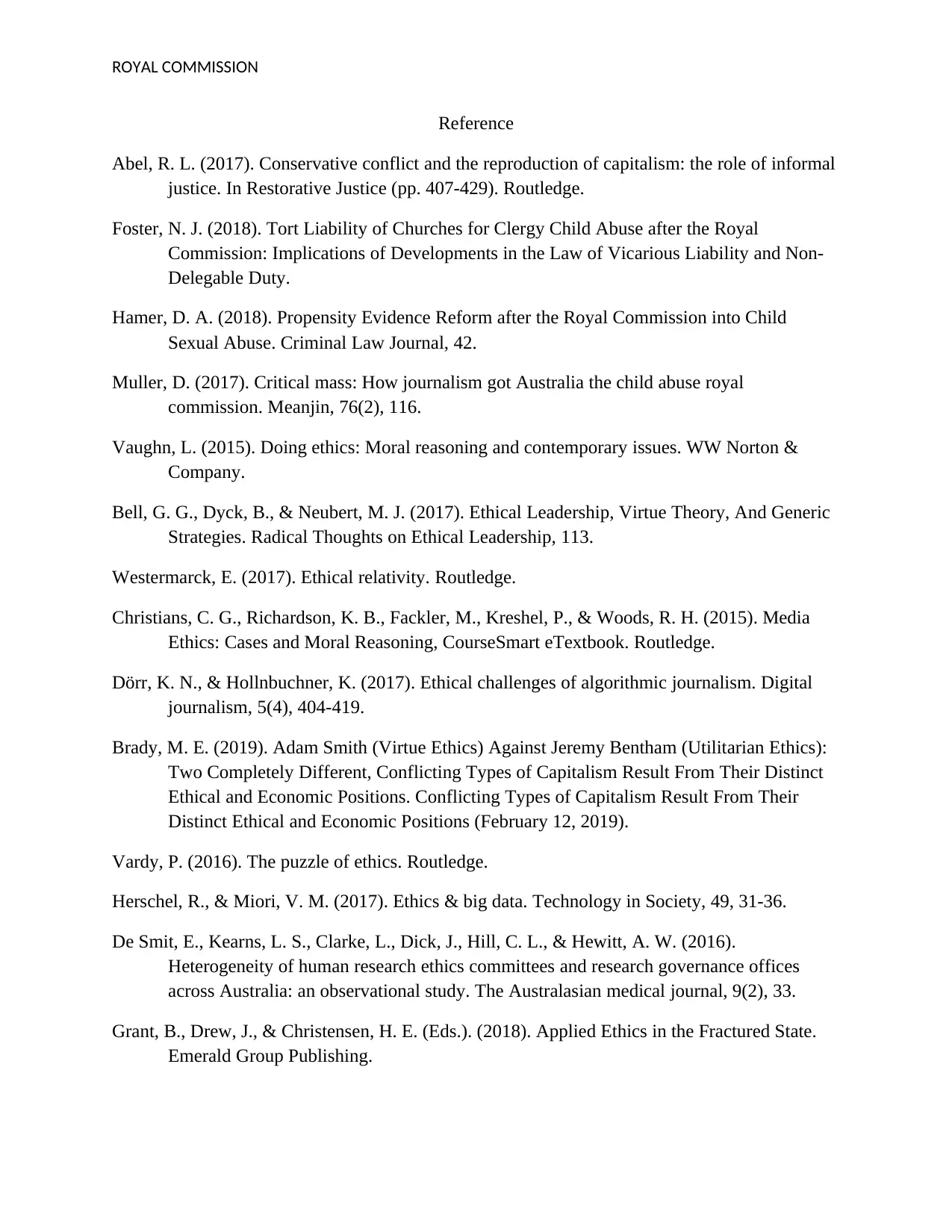
ROYAL COMMISSION
Reference
Abel, R. L. (2017). Conservative conflict and the reproduction of capitalism: the role of informal
justice. In Restorative Justice (pp. 407-429). Routledge.
Foster, N. J. (2018). Tort Liability of Churches for Clergy Child Abuse after the Royal
Commission: Implications of Developments in the Law of Vicarious Liability and Non-
Delegable Duty.
Hamer, D. A. (2018). Propensity Evidence Reform after the Royal Commission into Child
Sexual Abuse. Criminal Law Journal, 42.
Muller, D. (2017). Critical mass: How journalism got Australia the child abuse royal
commission. Meanjin, 76(2), 116.
Vaughn, L. (2015). Doing ethics: Moral reasoning and contemporary issues. WW Norton &
Company.
Bell, G. G., Dyck, B., & Neubert, M. J. (2017). Ethical Leadership, Virtue Theory, And Generic
Strategies. Radical Thoughts on Ethical Leadership, 113.
Westermarck, E. (2017). Ethical relativity. Routledge.
Christians, C. G., Richardson, K. B., Fackler, M., Kreshel, P., & Woods, R. H. (2015). Media
Ethics: Cases and Moral Reasoning, CourseSmart eTextbook. Routledge.
Dörr, K. N., & Hollnbuchner, K. (2017). Ethical challenges of algorithmic journalism. Digital
journalism, 5(4), 404-419.
Brady, M. E. (2019). Adam Smith (Virtue Ethics) Against Jeremy Bentham (Utilitarian Ethics):
Two Completely Different, Conflicting Types of Capitalism Result From Their Distinct
Ethical and Economic Positions. Conflicting Types of Capitalism Result From Their
Distinct Ethical and Economic Positions (February 12, 2019).
Vardy, P. (2016). The puzzle of ethics. Routledge.
Herschel, R., & Miori, V. M. (2017). Ethics & big data. Technology in Society, 49, 31-36.
De Smit, E., Kearns, L. S., Clarke, L., Dick, J., Hill, C. L., & Hewitt, A. W. (2016).
Heterogeneity of human research ethics committees and research governance offices
across Australia: an observational study. The Australasian medical journal, 9(2), 33.
Grant, B., Drew, J., & Christensen, H. E. (Eds.). (2018). Applied Ethics in the Fractured State.
Emerald Group Publishing.
Reference
Abel, R. L. (2017). Conservative conflict and the reproduction of capitalism: the role of informal
justice. In Restorative Justice (pp. 407-429). Routledge.
Foster, N. J. (2018). Tort Liability of Churches for Clergy Child Abuse after the Royal
Commission: Implications of Developments in the Law of Vicarious Liability and Non-
Delegable Duty.
Hamer, D. A. (2018). Propensity Evidence Reform after the Royal Commission into Child
Sexual Abuse. Criminal Law Journal, 42.
Muller, D. (2017). Critical mass: How journalism got Australia the child abuse royal
commission. Meanjin, 76(2), 116.
Vaughn, L. (2015). Doing ethics: Moral reasoning and contemporary issues. WW Norton &
Company.
Bell, G. G., Dyck, B., & Neubert, M. J. (2017). Ethical Leadership, Virtue Theory, And Generic
Strategies. Radical Thoughts on Ethical Leadership, 113.
Westermarck, E. (2017). Ethical relativity. Routledge.
Christians, C. G., Richardson, K. B., Fackler, M., Kreshel, P., & Woods, R. H. (2015). Media
Ethics: Cases and Moral Reasoning, CourseSmart eTextbook. Routledge.
Dörr, K. N., & Hollnbuchner, K. (2017). Ethical challenges of algorithmic journalism. Digital
journalism, 5(4), 404-419.
Brady, M. E. (2019). Adam Smith (Virtue Ethics) Against Jeremy Bentham (Utilitarian Ethics):
Two Completely Different, Conflicting Types of Capitalism Result From Their Distinct
Ethical and Economic Positions. Conflicting Types of Capitalism Result From Their
Distinct Ethical and Economic Positions (February 12, 2019).
Vardy, P. (2016). The puzzle of ethics. Routledge.
Herschel, R., & Miori, V. M. (2017). Ethics & big data. Technology in Society, 49, 31-36.
De Smit, E., Kearns, L. S., Clarke, L., Dick, J., Hill, C. L., & Hewitt, A. W. (2016).
Heterogeneity of human research ethics committees and research governance offices
across Australia: an observational study. The Australasian medical journal, 9(2), 33.
Grant, B., Drew, J., & Christensen, H. E. (Eds.). (2018). Applied Ethics in the Fractured State.
Emerald Group Publishing.
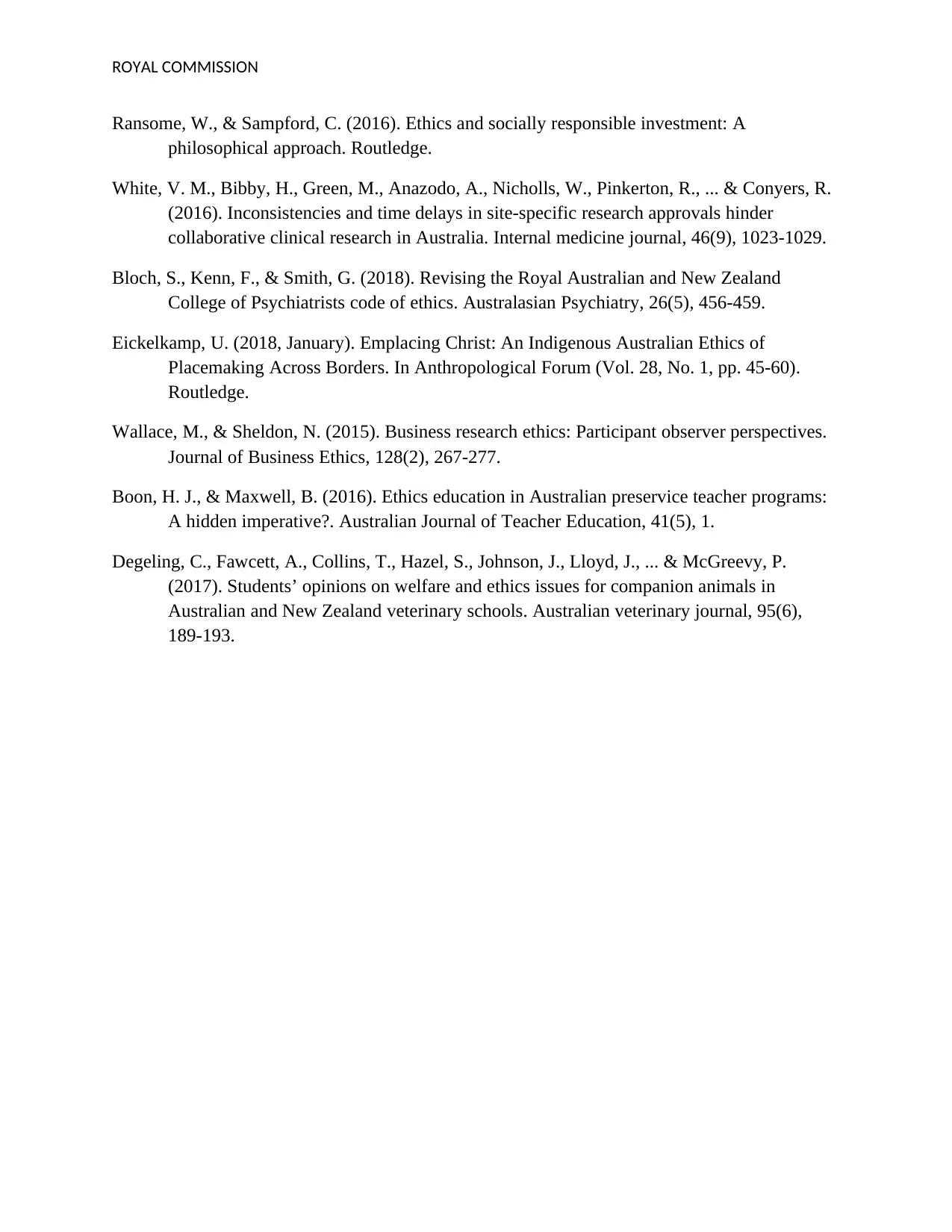
ROYAL COMMISSION
Ransome, W., & Sampford, C. (2016). Ethics and socially responsible investment: A
philosophical approach. Routledge.
White, V. M., Bibby, H., Green, M., Anazodo, A., Nicholls, W., Pinkerton, R., ... & Conyers, R.
(2016). Inconsistencies and time delays in site‐specific research approvals hinder
collaborative clinical research in Australia. Internal medicine journal, 46(9), 1023-1029.
Bloch, S., Kenn, F., & Smith, G. (2018). Revising the Royal Australian and New Zealand
College of Psychiatrists code of ethics. Australasian Psychiatry, 26(5), 456-459.
Eickelkamp, U. (2018, January). Emplacing Christ: An Indigenous Australian Ethics of
Placemaking Across Borders. In Anthropological Forum (Vol. 28, No. 1, pp. 45-60).
Routledge.
Wallace, M., & Sheldon, N. (2015). Business research ethics: Participant observer perspectives.
Journal of Business Ethics, 128(2), 267-277.
Boon, H. J., & Maxwell, B. (2016). Ethics education in Australian preservice teacher programs:
A hidden imperative?. Australian Journal of Teacher Education, 41(5), 1.
Degeling, C., Fawcett, A., Collins, T., Hazel, S., Johnson, J., Lloyd, J., ... & McGreevy, P.
(2017). Students’ opinions on welfare and ethics issues for companion animals in
Australian and New Zealand veterinary schools. Australian veterinary journal, 95(6),
189-193.
Ransome, W., & Sampford, C. (2016). Ethics and socially responsible investment: A
philosophical approach. Routledge.
White, V. M., Bibby, H., Green, M., Anazodo, A., Nicholls, W., Pinkerton, R., ... & Conyers, R.
(2016). Inconsistencies and time delays in site‐specific research approvals hinder
collaborative clinical research in Australia. Internal medicine journal, 46(9), 1023-1029.
Bloch, S., Kenn, F., & Smith, G. (2018). Revising the Royal Australian and New Zealand
College of Psychiatrists code of ethics. Australasian Psychiatry, 26(5), 456-459.
Eickelkamp, U. (2018, January). Emplacing Christ: An Indigenous Australian Ethics of
Placemaking Across Borders. In Anthropological Forum (Vol. 28, No. 1, pp. 45-60).
Routledge.
Wallace, M., & Sheldon, N. (2015). Business research ethics: Participant observer perspectives.
Journal of Business Ethics, 128(2), 267-277.
Boon, H. J., & Maxwell, B. (2016). Ethics education in Australian preservice teacher programs:
A hidden imperative?. Australian Journal of Teacher Education, 41(5), 1.
Degeling, C., Fawcett, A., Collins, T., Hazel, S., Johnson, J., Lloyd, J., ... & McGreevy, P.
(2017). Students’ opinions on welfare and ethics issues for companion animals in
Australian and New Zealand veterinary schools. Australian veterinary journal, 95(6),
189-193.
1 out of 12
Related Documents
Your All-in-One AI-Powered Toolkit for Academic Success.
+13062052269
info@desklib.com
Available 24*7 on WhatsApp / Email
![[object Object]](/_next/static/media/star-bottom.7253800d.svg)
Unlock your academic potential
© 2024 | Zucol Services PVT LTD | All rights reserved.





